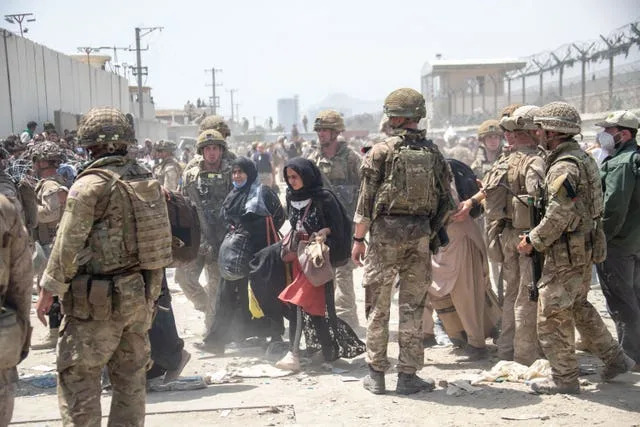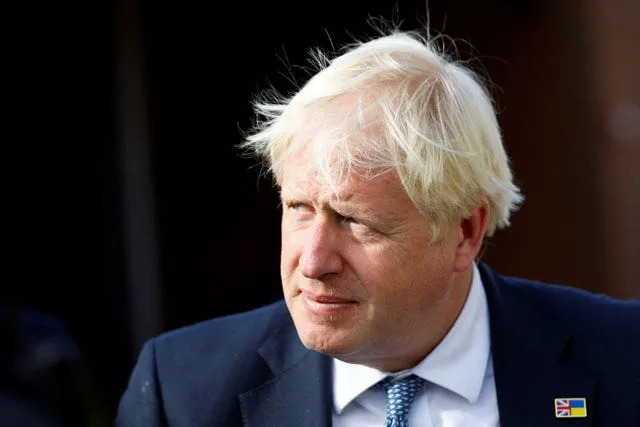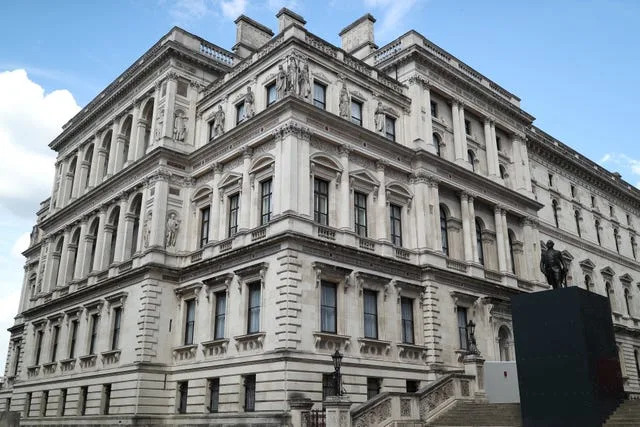Matthew Weaver
Thu, 2 May 2024

Josie Stewart was ‘horrified’ by the chaos and dysfunction at the Whitehall crisis centre, the tribunal heard.Photograph: Linda Nylind/The Guardian
A Foreign Office civil servant felt “morally compelled” to speak to the media about the chaotic withdrawal from Afghanistan after the government presented a “dishonest account” of what happened, an employment tribunal has heard.
Josie Stewart was sacked by the Foreign Office (FCDO) after blowing the whistle on the failures of the withdrawal from Kabul and disclosing emails indicating Boris Johnson’s involvement in an “outrageous” decision to prioritise the evacuation of staff from the animal charity Nowzad, despite his denials.
Her claim for unfair dismissal on the grounds that her whistleblowing was protected under the Employment Rights Act 1996 began on Thursday at the central London employment tribunal.
Stewart was “horrified” by the chaos and dysfunction at the Whitehall crisis centre where she had volunteered to work when the Taliban took over Afghanistan in August 2021, the tribunal was told.
She believed “the government’s mismanagement of the crisis caused huge amounts of avoidable suffering in Afghanistan and that it had probably cost lives”.
Her lawyers’ opening arguments also said Stewart and others “believed that, at a moment of very high stakes, the UK government failed badly, and that political and civil service leaders sought to ‘cover up’ failures, presenting a misleading and in some instances even dishonest account to the public”.
She agreed to speak anonymously to the BBC about these failures after a junior civil servant, Raphael Marshall, gave damning evidence to a committee of MPs about the withdrawal from Afghanistan and was then subjected to attempts to discredit him, the tribunal was told.
She also leaked emails to the BBC after Johnson had described as “complete nonsense” claims that he had been involved in the decision to evacuate Nowzad staff and animals, the court was told. The emails “indicated, contrary to the prime minister’s claim, that No 10 had been involved in the decisions relating to Nowzad”, the submission said.
It added: “[Stewart] had viewed numerous emails which appeared to confirm the PM’s involvement in the Nowzad decision and it was impossible to reconcile those emails with the PM’s public denial of any involvement.” Her lawyers argued that Stewart was acting in the public interest.
She was suspended and then sacked after a BBC reporter tweeted the emails and “unintentionally” disclosed Stewart’s identity. The case will decide the extent of the rights of civil servants to make public interest disclosures to the press.
In her witness statement, Stewart said she knew she was unauthorised to speak to the media but felt she had been put in an impossible position. “Doing so [speaking to the media] was less wrong than my alternatives,” her statement said. Her lawyers described Stewart as “a committed and public-spirited person who was deeply troubled by what she observed in the crisis centre, and by subsequent portrayals of what had happened, and who in the end felt morally compelled to speak out”.
She was dismissed without any allowance for statutory whistleblowing protection, the submission said.
Lawyers for the FCDO had previously challenged the admissibility of some of Stewart’s evidence on the grounds that including parts of her witness testimony would breach principles of parliamentary privilege.
In November, the employment tribunal decided to allow some of the whistleblower’s contested evidence, but redacted some elements.
An FCDO spokesperson said: “The 2021 Afghanistan response was the biggest mission of its kind in generations and the second largest evacuation carried out by any country – and we are proud of our staff who worked tirelessly to evacuate more than 15,000 people within a fortnight.
“We have learned lessons from the evacuation and have seen the benefits of this work in our response to the Sudan and Niger evacuations, as well as in our response to Russia’s invasion of Ukraine and the ongoing situation in the Middle East.
“We have continued to provide assistance to those in Afghanistan, including bringing thousands more people to safety. We cannot comment further while legal proceedings are ongoing.”
The tribunal will continue until 20 May.
Failures in Afghanistan evacuation probably cost lives, tribunal hears
Piers Mucklejohn, PA
Thu, 2 May 2024
A sacked Foreign Office whistleblower believed the Government’s “chaotic, dysfunctional and ineffective” response to the fall of Kabul “probably cost lives”, a tribunal has heard.
Josie Stewart was “horrified” at how the Afghanistan Crisis Centre was run, as top politicians and officials – including then-prime minister Boris Johnson – prioritised “managing political and media fallout” over evacuating “those in most need on the ground”, tribunal documents say.
Ms Stewart, a former senior official at the Foreign, Commonwealth and Development Office (FCDO), was dismissed after an interview with the BBC in which she spoke about her “tragic experiences” working in the FCDO crisis centre in the summer of 2021.
Following the Taliban gaining control of Afghanistan, the British government evacuated 15,000 people from its capital, Kabul, in what was known as Operation Pitting.
On Thursday, Ms Stewart attended an employment tribunal against the department, in which she is alleging unfair dismissal for making a protected disclosure.
The case will decide the extent of the rights of civil servants to make public interest disclosures to the press when “misleading claims” from ministers and civil servants are made to Parliament and the media, according to Ms Stewart’s lawyers.

Following the Taliban gaining control of Afghanistan in summer 2021, the British government evacuated 15,000 people from the country (MoD/PA)
Documents supplied to the Central London Employment Tribunal read: “(Ms Stewart) believed that the Government’s mismanagement of the crisis caused huge amounts of avoidable suffering in Afghanistan and that it had probably cost lives.”
Ms Stewart also suggested Mr Johnson, then-foreign secretary Dominic Raab and other “political and civil service leaders” made misleading claims about the success of the evacuation efforts in Afghanistan and the performance of the crisis centre.
She said in some instances officials were deliberately “dishonest”.
The tribunal heard Mr Johnson was involved in an “outrageous” decision to allow animals and staff working for the charity Nowzad to use Kabul airport which he then publicly denied involvement with – an allegation Ms Stewart had put before the Foreign Affairs Select Committee in 2022.
Internal emails, to which Ms Stewart had access, demonstrated that Mr Johnson had been involved in the decision, her lawyers argued.
They added: “Demonstrating that the (Prime Minister) had intervened in a potentially life and death scenario to favour a less vulnerable group over a more vulnerable group, and then publicly denied doing so, is a matter of quintessential public interest.”

The tribunal heard Boris Johnson was involved in an ‘outrageous’ decision to allow animals and staff working for the charity Nowzad to use Kabul airport (Andrew Boyers/PA)
Mr Raab had told the same committee in September 2021 that he believed the crisis centre had met requirements, a comment Ms Stewart had suggested was “misleading” at a preliminary tribunal hearing last year.
Ms Stewart – whose anonymity was compromised after her unredacted emails were accidentally posted on social media – did not feel “safe” disclosing her concerns internally at the FCDO as she feared the department may have put “a black mark against my name”, tribunal judges heard.
Her lawyers said this left the whistleblower in an “impossible” situation as she believed it was in the public interest to speak out about how the Government had failed and subsequently attempted to “cover up” those failures.
In a witness statement referred to at an earlier preliminary hearing, Ms Stewart claimed she “witnessed denial, lies and the complete lack of accountability” while working on the Afghan crisis response.
She said: “In my career as a civil servant, I witnessed many failings within government and was privy to much information that would have made a good news story.
“I disclosed none of it.
“But through the Afghan evacuation, I witnessed both the biggest foreign policy failure of our time and the shameful handling of the resulting crisis.

Ms Stewart did not feel ‘safe’ disclosing her concerns internally (Yui Mok/PA)
Lawyers for the FCDO had previously challenged the admissibility of some of Ms Stewart’s evidence on the grounds that including parts of her witness testimony would breach article nine of the Bill of Rights 1689 and general principles of parliamentary privilege.
Article nine says: “The freedom of speech and debates or proceedings in Parliament ought not to be impeached or questioned in any court or place out of Parliament.”
In November, the employment tribunal decided to allow some of the whistleblower’s contested evidence, but redacted some elements.
An FCDO spokesperson said: “The 2021 Afghanistan response was the biggest mission of its kind in generations and the second largest evacuation carried out by any country – and we are proud of our staff who worked tirelessly to evacuate more than 15,000 people within a fortnight.
“We have learned lessons from the evacuation and have seen the benefits of this work in our response to the Sudan and Niger evacuations, as well as in our response to Russia’s invasion of Ukraine and the ongoing situation in the Middle East.
“We have continued to provide assistance to those in Afghanistan, including bringing thousands more people to safety. We cannot comment further while legal proceedings are ongoing.”
The tribunal will continue until May 20.
No comments:
Post a Comment